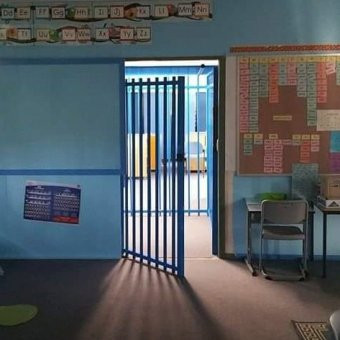
Disability advocates say mainstream schools are unable to meet the needs of autistic children, and as a result families with autistic children are being forced to homeschool their children.
Many parents have told a Senate inquiry that their autistic children are bullied, misunderstood or placed in cages or seclusion areas in mainstream schools.
Sydney mother Cassandra Winter homeschools her son, who has autism and is currently in grade two.
She said the two schools he was previously attending lacked specialised support.
"My son had attended a public school, from there he had been referred through to a school for specific purposes, and unfortunately his anxiety levels just increased to the point that we got to what's termed 'school refusal'," she said.
Ms Winter runs a support group called Autistic Family Collective, which represents about 180 families with 230 school-aged autistic children.
Increasingly, many of the parents in the group are teaching their autistic children at home.
"Some parents have had to give up their jobs in order to homeschool," Ms Winter said.
"There there isn't a lot of support when homeschooling. Ultimately, what we would like to see is true inclusion."
Stephanie Gotlib from Children with Disabilities Australia said homeschooling is often the only option when autistic children are refused enrolment at schools.
"Why isn't that student afforded their rights to go to the school?" she said.
"I mean often kids want to go to their local school but they're too often told, 'No we can't meet the needs of your child'. Sometimes they're told, 'We don't want them'."
Parents "taking matters into their own hands"
A Senate committee is currently looking at whether there is a lack of support for disabled children in Australian schools.
Nationals senator Bridget McKenzie is chairing the inquiry.
"Parents are taking matters into their own hands and saying, 'well if I cannot find an inclusive space for my child, then they're choosing to educate that child at home'," she said.
"I think there's a variety of measures that government can do to address this issue, but one of them is absolutely ensuring that principals and school councils are very very aware of their responsibilities under the Disability Discrimination Act."
Michael Ward is principal of Aspley East State School, a primary school in Brisbane's north.
Eight per cent of students at the school are disabled and all teachers have been trained in special education but Mr Ward believes there are sound reasons why a school may refuse to enrol a child with a disability.
"I know the inquiry heard a lot of issues from parents around feeling that schools didn't want their children in their school and the door was closed and that there were issues around that," he said.
"And schools do have enrolment management plans and the reason for that is around the concept of natural proportion.
"So there is a limit to how much additional need in one classroom one teacher can deal with, and so it is important that schools do try to manage that and control that with their enrolments.
"And I understand what parents are doing. They want the best for their kids, they hear stories about schools that are doing well and they want to get their kids into those schools, but really everyone needs to understand that modern classrooms are very complex places."
A Canberra principal was sacked after a photo emerged earlier this year of an autistic boy inside a cage.
And the inquiry has heard from many other families whose autistic children have been restrained or placed in so-called "seclusion areas".
"When we hear about a child being locked in a cage that's abhorrent and it shouldn't be happening," Ms Gotlib said.
"Those incidents - they reflect a system in crisis where students with disability aren't getting access to educational programs that enrich and extend them, and instead we're getting interventions which look at how to contain and control a child."